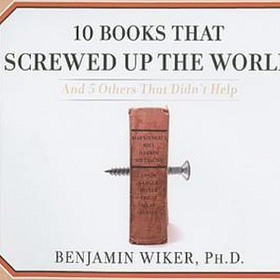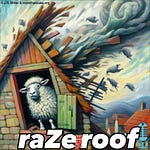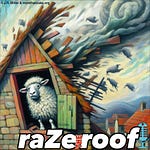If we as Christians hope to Cultivate the Culture and sow the seed of the Gospel of Jesus Christ, then we must understand the big ideas that have shaped the worldview of the people around us. Today, R. Scott Smith joins Joe and Leroy to explore how Thomas Hobbes'’ old ideas have shaped our political philosophy of power, leadership, and ethical narcissism. If you want to do some homework before these monthly discussions, pick up a copy of Benjamin Wiker’s book, 10 Books that Screwed Up the World. We’ll cover one chapter at a time so it’s easy enough to read along.
REFERENCES
10 Books that Screwed Up the World: And 5 Others That Didn't Help by Benjamin Wiker
The Complete Harvard Classics 2024 Edition compiled and Edited by Charles W. Eliot LL D in 1909, the Harvard Classics is a 51-volume Anthology of classic literature from throughout the history of western civilization. The set is sometimes called "Eliot's Five-Foot Shelf."
Atheism from the Reformation to the Enlightenment, Oxford University Press, edited by Michael Hunter and David Wootton.
TODAY”S GUEST HOST
R. Scott Smith (PhD, University of Southern California) is the interim director, as well as professor of ethics and Christian apologetics, of Talbot School of Theology's MA Christian Apologetics program. Some of his books include In Search of Moral Knowledge (IVP, 2014), Naturalism and Our Knowledge of Reality (Routledge, 2012), and Exposing the Roots of Constructivism: Nominalism and the Ontology of Knowledge (Lexington, 2024). He is currently working on the ethics of antiracism and critical social justice.
EPISODES IN THIS SERIES
10 Books that Screwed Up the World
If you want to understand the culture, you need to understand philosophy. But if that task seems overwhelming, this podcast series is just for you.
OUTLINE OF LEVIATHAN
This is such a massive book, I thought it might be helpful to provide an outline of the content along with some short bullet point summaries.
Part I: Of Man
Chapter I: Of Sense
Explores the origin of thoughts, arguing that all thoughts arise from sense perception, triggered by external objects interacting with our sensory organs.
Introduces the concept of "imagination," explaining it as a decaying sense impression that lingers even after the object is gone.
Chapter II: Of Imagination
Distinguishes between regulated and unregulated thought, emphasizing the human capacity for designed thinking.
Describes the processes of remembrance and foresight, highlighting the role of experience in shaping our understanding of the past and future.
Chapter III: Of the Consequence or Train of Imaginations
Examines how the train of thoughts can be guided by desire, leading to deliberation.
Introduces the concept of "prudence," recognizing its limitations and emphasizing the role of experience in decision-making.
Chapter IV: Of Speech
Argues that speech is crucial for reasoning and knowledge acquisition.
Delves into the use of names, both proper and universal, and their role in organizing and manipulating thoughts.
Chapter V: Of Reason and Science
Defines reason as a computational process, adding and subtracting the consequences of general names.
Acknowledges the fallibility of individual reasoning and the importance of an agreed-upon standard of truth.
Chapter VI: Of the Interior Beginnings of Voluntary Motions, Commonly Called the Passions, and the Speeches by Which They Are Expressed
Explores the relationship between passions, desires, and voluntary actions.
Defines "deliberation" as the internal struggle between competing desires.
Chapter VII: Of the Ends or Resolutions of Discourse
Defines "will" as the last appetite in deliberation, the driving force behind voluntary actions.
Discusses the role of judgement in the process of deliberation and decision-making.
Chapter VIII: Of the Virtues Commonly Called Intellectual, and Their Contrary Defects
Examines the nature of intellectual virtues, including wit, discretion, and judgement.
Explores the connection between these virtues and individual passions and experiences.
Chapter IX: Of the Several Subjects of Knowledge
Classifies the different types of knowledge and their respective objects of study.
Emphasizes the importance of understanding the limitations and scope of each type of knowledge.
Chapter X: Of Power, Worth, Dignity, Honour, and Worthiness
Defines "power" as the ability to achieve desired outcomes.
Discusses the concept of "honour" and its various forms, both natural and those established by societal conventions.
Chapter XI: Of the Difference of Manners
Explores the origins of good and evil manners.
Analyzes the role of power, fear, and social norms in shaping individual behavior and interactions.
Chapter XII: Of Religion
Delves into the nature of religion and its role in society.
Examines the causes of religious belief, highlighting fear and the desire for security as primary motivators.
Chapter XIII: Of the Natural Condition of Mankind as Concerning Their Felicity and Misery
Argues that the natural condition of mankind is a state of war, driven by competition and fear.
Highlights the need for a sovereign power to establish peace and security.
Chapter XIV: Of the First and Second Natural Laws, and of Contracts
Defines the right of nature and the concept of "liberty."
Introduces the principles of contract theory, outlining the conditions for valid contracts and the nature of obligation.
Chapter XV: Of Other Laws of Nature
Delves further into the laws of nature, such as justice, gratitude, and equity.
Explains how these laws aim to promote peace and cooperation within society.
Chapter XVI: Of Persons, Authors, and Things Personated
Discusses the concept of "personation," where individuals or groups can act on behalf of others.
Explains the difference between natural and artificial persons, setting the stage for the concept of the sovereign.
Chapter XVII: Of the Causes, Generation, and Definition of a Commonwealth
Explains the motivation for creating a commonwealth, emphasizing the need for security and escaping the state of war.
Defines "sovereignty" and outlines the different ways it can be established.
Chapter XVIII: Of the Rights of Sovereigns by Institution
Enumerates the rights and powers of a sovereign established through the consent of the governed.
Highlights the absolute nature of sovereign power and its role in maintaining peace and order.
Chapter XIX: Of the Several Kinds of Commonwealth by Institution, and of Succession to the Sovereign Power
Classifies different types of commonwealths based on the structure of sovereignty.
Discusses the challenges of succession and the potential for instability during transitions of power.
Chapter XX: Of Dominion Paternal and Despotical
Distinguishes between commonwealths acquired by institution and acquisition (conquest).
Explores the nature of paternal dominion and its basis in consent, rather than mere biological parentage.
Chapter XXI: Of the Liberty of Subjects
Clarifies the concept of "liberty" within a commonwealth.
Emphasizes that true liberty lies in the areas where the sovereign has not explicitly prescribed rules.
Chapter XXII: Of Systems Subject, Political, and Private
Classifies different types of systems or bodies within a commonwealth, both public and private.
Explains the nature of representation and the limitations of power within subordinate bodies.
Chapter XXIII: Of the Public Ministers of Sovereign Power
Discusses the role of public ministers, such as counselors, judges, and ambassadors.
Highlights their function as representatives of the sovereign and their role in administering the commonwealth.
Chapter XXIV: Of the Nutrition and Procreation of a Commonwealth
Examines the economic foundations of a commonwealth, focusing on property, trade, and the role of money.
Compares the circulation of money within a commonwealth to the circulation of blood within a body.
Chapter XXV: Of Counsel
Explores the role of counsel and deliberation in decision-making.
Argues for the effectiveness of consulting experts in their respective domains.
Chapter XXVI: Of Civil Laws
Defines civil laws and their function in regulating behavior within a commonwealth.
Discusses the sources of law and the role of the sovereign as the ultimate legislator.
Chapter XXVII: Of Crimes, Excuses, and Extenuations
Defines "sin" and "crime," distinguishing between violations of divine and civil law.
Explores the concept of criminal intent and various factors that might excuse or mitigate criminal behavior.
Chapter XXVIII: Of Punishments and Rewards
Discusses the purpose and justification for punishment, emphasizing deterrence and the maintenance of order.
Explores the role of rewards in encouraging desirable behavior within a commonwealth.
Chapter XXIX: Of Those Things That Weaken or Tend to the Dissolution of a Commonwealth
Identifies factors that can undermine the stability of a commonwealth.
Analyzes the dangers of internal divisions, corruption, and challenges to sovereign authority.
Chapter XXX: Of the Office of the Sovereign Representative
Outlines the core duties and responsibilities of the sovereign.
Emphasizes the importance of maintaining justice, security, and the well-being of the commonwealth.
Chapter XXXI: Of the Kingdom of God by Nature
Introduces the concept of God's natural kingdom, where God reigns over all through His power.
Emphasizes God's absolute power and His right to punish those who disobey His laws.
Chapter XXXII: Of the Principles of Christian Politics
Discusses the nature of worship and how to properly honor God.
Argues against theological disputes based on reason, emphasizing the importance of faith and revelation.
Chapter XXXIII: Of the Scripture
Examines the nature of scripture and its authority within a commonwealth.
Argues that the sovereign determines which books are canonical and have the force of law within their dominion.
Chapter XXXIV: Of the Signification of Spirit, Angel, and Inspiration in the Books of Holy Scripture
Explores the metaphorical language of scripture and the different interpretations of "spirit" and "inspiration."
Emphasizes the need for a clear understanding of these terms to avoid misinterpretations and misapplications of scripture.
Chapter XXXV: Of the Signification in Scripture of the Kingdom of God, of Holy, Sacred, and Sacrament
Clarifies the meaning of the "Kingdom of God" as established through covenant with the Jews under Moses.
Explores the concept of "holiness" and its relation to God's ownership and special purpose.
Chapter XXXVI: Of the Word of God, and of Prophets
Differentiates between the literal and metaphorical meanings of "the word of God" in scripture.
Defines "prophets" and discusses the various ways God communicates his will to them.
Chapter XXXVII: Of Miracles, and Their Use
Explores the nature of miracles and their role in confirming the authority of prophets.
Argues that miracles alone are not sufficient proof of divine authority and emphasizes the importance of aligning with the sovereign's pronouncements.
Chapter XXXVIII: Of the Signification in Scripture of Eternal Life, Hell, Salvation, the World to Come, and Redemption
Clarifies the biblical concepts of eternal life, hell, salvation, and redemption.
Emphasizes the need for a proper understanding of these concepts to avoid misinterpretations and manipulation.
Chapter XXXIX: Of the Signification in Scripture of the Word Church
Defines the Church as a community of believers unified under Christ.
Discusses the role of the Church in providing guidance and support for its members on the path to salvation.
Chapter XL: Of the Rights of the Kingdom of God, in Abraham, Moses, the High Priests, and the Kings of Judah
Traces the historical development of the Kingdom of God through key figures like Abraham, Moses, and the kings of Judah.
Highlights the covenant between God and the Jews and the evolution of leadership within the Kingdom.
Chapter XLI: Of the Office of Our Blessed Saviour
Explores the role of Jesus Christ as the Messiah and his mission to redeem humanity.
Clarifies the nature of Christ's kingdom as a future reality, established after his second coming and the day of judgement.
Chapter XLII: Of Power Ecclesiastical
Defines ecclesiastical power and its function within a Christian commonwealth.
Examines the roles of pastors, bishops, and other church leaders in administering the sacraments and guiding the faithful.
Chapter XLIII: Of the Offices of Christian Kings, and of Supreme Pastors
Outlines the duties and responsibilities of Christian kings, emphasizing their role in protecting the Church and upholding Christian values.
Discusses the relationship between the Church and the civil sovereign, arguing for the ultimate authority of the sovereign in matters of religion.
Chapter XLIV: Of Spiritual Darkness from Misinterpretation of Scripture
Critiques the misinterpretations of scripture used to justify papal authority and undermine the sovereignty of civil rulers.
Highlights the dangers of such misinterpretations for the stability and well-being of commonwealths.
Chapter XLV: Of Demonology, and Other Relics of the Religion of the Gentiles
Examines beliefs about demons and other supernatural phenomena that persist in Christian societies.
Critiques the influence of these beliefs and argues for a rational approach to religion based on scripture and sound doctrine.
Chapter XLVI: Of Darkness from Vain Philosophy, and Fabulous Traditions
Critiques the influence of vain philosophy and fabulous traditions on religious understanding.
Argues for a clear distinction between reason and revelation, emphasizing the primacy of scripture in matters of faith.
Chapter XLVII: Of the Benefit That Proceedeth from Such Darkness, and to Whom It Accrueth
Analyzes the beneficiaries of spiritual darkness, highlighting those who seek to exploit ignorance and superstition for their own power and gain.
Underscores the importance of critical thinking and a proper understanding of scripture to counter such manipulation.
Key Themes
Human Nature: Hobbes posits a mechanistic view of human beings driven by self-preservation and a perpetual desire for power. He argues that in the absence of a strong sovereign, human life would be "solitary, poor, nasty, brutish, and short."
The Social Contract: As a solution to the chaos of the state of nature, Hobbes proposes the social contract, where individuals relinquish some individual rights to a sovereign power in exchange for security and order.
The Sovereign Power: Hobbes advocates for an absolute sovereign (Leviathan) with undivided power to enforce laws, dictate religion, and maintain peace. He considers various forms of sovereignty, including monarchy and assembly, arguing that their authority stems from the consent of the governed.
Key Ideas and Facts
Ethical Egoism: A moral theory asserting that individuals ought to act solely in their self-interest, maximizing personal benefit and minimizing harm.
Psychological Egoism: The descriptive claim that all human actions are ultimately motivated by self-interest, even seemingly altruistic ones.
Nominalism: A philosophical view denying the existence of universal essences or abstract entities, arguing that reality consists only of particular things and their names.
Materialism: The belief that reality is fundamentally composed of matter and that all phenomena, including consciousness and thought, can be explained in terms of physical processes.
Fact-Value Split: A philosophical distinction separating objective facts, accessible through reason and empirical observation, from subjective values, seen as personal preferences or beliefs.
Origin of Thoughts and Reason: Hobbes argues that thoughts arise from sensory experiences, and reason is merely the "reckoning of the consequences" of these thoughts. He compares reasoning to arithmetic, suggesting that even the most practiced individuals can err in their conclusions.
"For reason, in this sense, is nothing but reckoning (that is, adding and subtracting) of the consequences of general names agreed upon for the marking and signifying of our thoughts" (Chapter V).
Nature of Deliberation and Will: He defines deliberation as the continuous fluctuation between appetites and aversions until an action is taken or deemed impossible. Will, according to Hobbes, is simply the final appetite or aversion in this process.
"Every deliberation is then said to end when that whereof they deliberate is either done or thought impossible" (Chapter VI).
Virtues and Discretion: Hobbes distinguishes between natural and acquired wit, emphasizing the importance of discretion - the ability to discern appropriate times, places, and persons for actions and words - as a key virtue.
"Judgement, therefore, without fancy is wit, but fancy without judgement, not." (Chapter VIII).
Forms of Honour and Dishonour: He explores the concepts of honour and dishonour, arguing that they are rooted in societal recognition of power. He examines various signs of honour, including titles, employment of counsel, and even historically accepted practices like piracy, highlighting the role of the sovereign in defining these symbols.
"To honour those another honours is to honour him; as a sign of approbation of his judgement. To honour his enemies is to dishonour him" (Chapter X).
The State of Nature and its Laws: Hobbes famously describes the state of nature as a war of all against all, where individuals are driven by their passions and self-interest. He outlines the fundamental right of nature: self-preservation. From this, he derives the first and second natural laws, which advocate for seeking peace and laying down the right to all things, respectively, as necessary for escaping the state of nature.
"The right of nature, which writers commonly call jus naturale, is the liberty each man hath to use his own power as he will himself for the preservation of his own nature" (Chapter XIV).
The Nature of Contracts: He defines contracts as the mutual transferring of right, emphasizing the importance of clear signs, such as words and actions, to indicate the will of the contractors. He also delves into the validity of covenants made under fear, arguing that they remain binding as long as the sovereign power upholds them.
"Signs of contract are either express or by inference. Express are words spoken with understanding of what they signify" (Chapter XIV).
Establishment of a Commonwealth: Hobbes outlines two ways a commonwealth can be established: through acquisition (force) or institution (agreement). He stresses that the sovereign power, regardless of its origin, possesses absolute authority, including control over the militia, judicature, and even the power to determine rewards and punishments.
"A COMMONWEALTH by acquisition is that where the sovereign power is acquired by force" (Chapter XX).
Liberty of the Subject: While advocating for an absolute sovereign, Hobbes also outlines the liberties retained by subjects. He argues that liberty exists in matters where the sovereign has not explicitly legislated, emphasizing that obedience to the sovereign is crucial for maintaining peace and security.
"The liberty of a subject lieth therefore only in those things which, in regulating their actions, the sovereign hath pretermitted" (Chapter XXI).
Role of the Sovereign in Religious Matters: Hobbes asserts that the sovereign holds ultimate authority in religious matters, determining which doctrines are to be taught and which books are considered canonical. He criticizes the notion of a universal Church holding power over sovereigns, stating that this would lead to chaos and undermine the sovereign's authority.
"It is true that God is the Sovereign of all sovereigns; and therefore, when he speaks to any subject, he ought to be obeyed, whatsoever any earthly potentate command to the contrary. But the question is not of obedience to God, but of when, and what God hath said" (Chapter XXXI).
Critique of Papal Power: He challenges the Catholic Church's claim of papal supremacy, arguing that the Pope's jurisdiction, like that of any other bishop, is ultimately derived from the civil sovereign. He contends that the idea of the Pope wielding supreme temporal power, even indirectly, is dangerous and undermines the authority of individual Commonwealths.
"Therefore when he allegeth, out of the sixth chapter of Luke, that our Saviour called his disciples together, and chose twelve of them, which he named Apostles, he proveth that he elected them (all, except Matthias, Paul, and Barnabas), and gave them power and command to preach, but not to judge of causes between man and man" (Chapter XLII).
DISCUSSION POINTS
Below is a list of questions covering just a few of the big ideas discussed in this episode. Subscribers, feel free to weigh in with your own ideas and join me in the conversation.
Based on Leviathan
What is the meaning of the title "Leviathan," and what does it symbolize in Hobbes' political philosophy?
What are the two primary ways of knowing, according to Hobbes?
According to Hobbes, what is the primary motivation for human actions?
What is Hobbes' understanding of the "state of nature," and how does it relate to the need for a sovereign?
What distinguishes the "train of regulated thoughts" in humans from that in beasts?
How does Hobbes define good and evil?
What are the two types of virtues, and how does Hobbes define them?
What is the relationship between deliberation and the will in Hobbes' philosophy?
What are the two ways in which a Commonwealth can be acquired, according to Hobbes?
How does Hobbes justify the absolute power of the sovereign?
What is the difference between a sin and a crime in Hobbes' framework?
Based on the Podcast
How does Hobbes' historical context inform our understanding of his work?
According to Dr. Miller how has Hobbes shaped our modern problem of what he calls, “ethical narcism.”
What are the three labels the podcast host uses to categorize Hobbes' beliefs about God? Explain each label.
How does Hobbes’ nominalist view of properties and qualities impact his understanding of morality?
How did Hobbes’ ideas lead to the commodification of God’s honor?
To what extent is Hobbes' political philosophy compatible with individual liberty? Discuss the potential tensions between the need for a strong sovereign and the protection of individual rights.
Evaluate Hobbes' concept of the "state of nature" as a justification for strong government. Consider alternative perspectives on human nature and the origins of political authority.
Critically examine Hobbes' argument that there are no objective moral truths. Discuss the implications of ethical subjectivism for individual behavior, societal norms, and the possibility of moral progress.
Consider Psalms 146. In what ways do Hobbes’ ideas fit with the Christian worldview? How do his ideas conflict with it?
Psalm 146:1–7
Praise the Lord! Praise the Lord, O my soul! I will praise the Lord as long as I live; I will sing praises to my God while I have my being.
Put not your trust in princes, in a son of man, in whom there is no salvation. When his breath departs, he returns to the earth; on that very day his plans perish.
Blessed is he whose help is the God of Jacob, whose hope is in the Lord his God who made heaven and earth, the sea, and all that is in them, who keeps faith forever; who executes justice for the oppressed, who gives food to the hungry. The Lord sets the prisoners free;
Episodes in this Series
10 Books that Screwed Up the World
If you want to understand the culture, you need to understand philosophy. But if that task seems overwhelming, this podcast series is just for you.



















Share this post